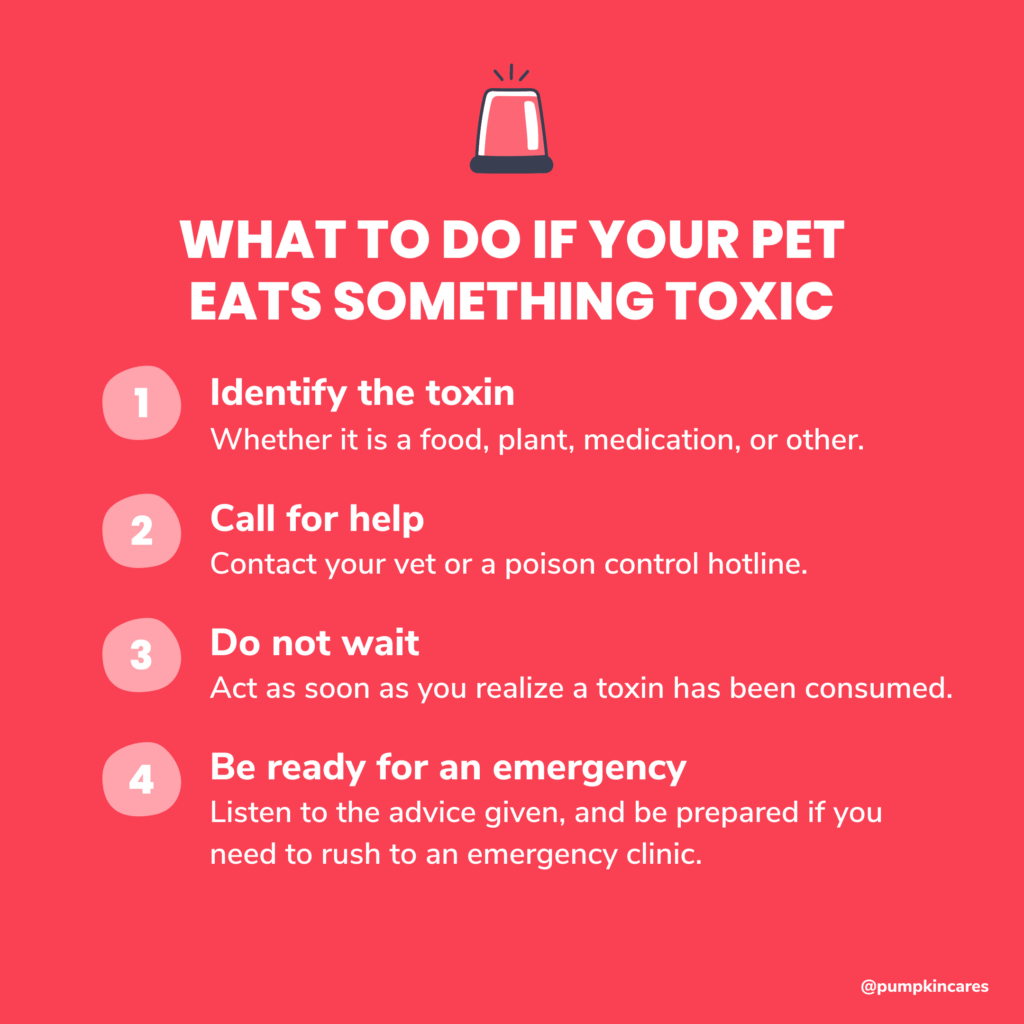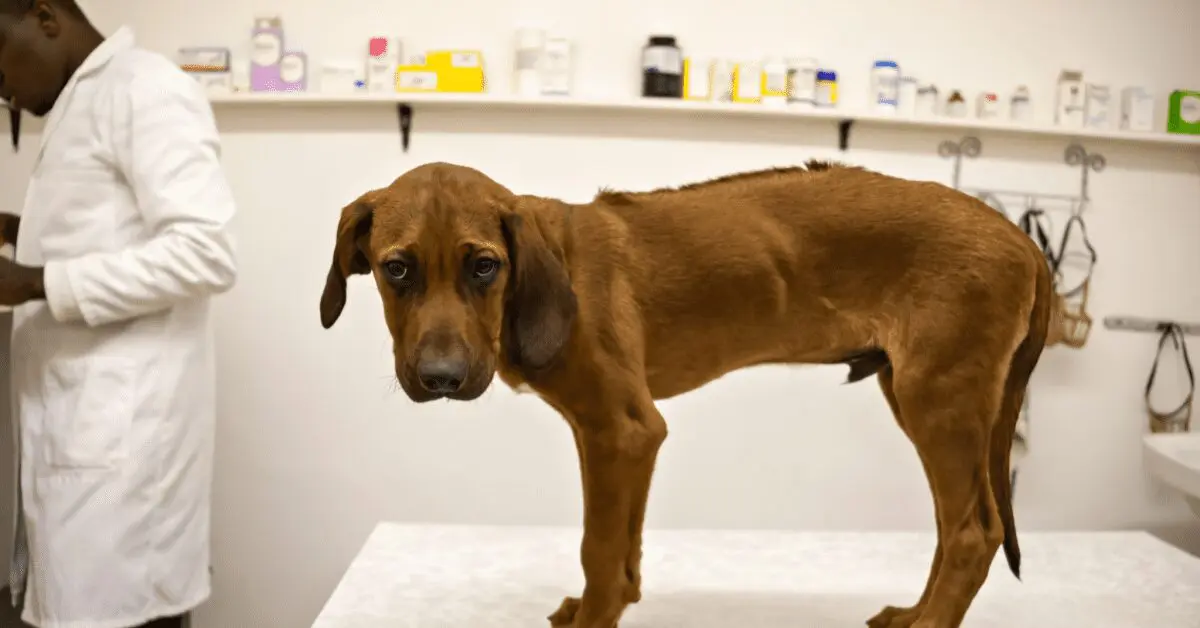Key Points
- Dogs that have eaten rat poison may not exhibit symptoms right away.
- It’s important not to induce vomiting unless a poison control expert or vet encourages you to do so.
- Different types of rodenticides require different treatments.
Your dog ate rat poison, and you need to act fast. It’s a stressful and life-threatening situation, but your quick response can help them receive the treatment they need. Here are some immediate steps you can take:
- Remove your dog from the rat poison. Ensure they cannot reach it again by putting it in a safe area.
- Check your dog for symptoms and assess whether they’re acting normally.
- Call the Animal Poison Control Center at 1-800-213-6680 or 855-764-7661. Prepare information about the rat poison to tell the poison expert.
- Get in touch with your vet and, if necessary, take your dog to an emergency vet clinic.
Regardless of how urgent the situation is, do not provide any home remedies or induce vomiting in your dog without consulting with the poison center and your vet. Doing so can lead to more dangerous situations for your pup, and a hefty medical bill to follow.
The sooner you contact the pet poison helpline and your vet, the faster you’ll be able to tend to your dog. Even if their symptoms aren’t noticeable right away, it’s best to take all necessary precautions.

Rat poison 101
Anticoagulant rodenticides, commonly known as rat or mice poison, are used to kill rats, mice, and other rodents. They can come in the form of pellets, powder, and even liquid, making it easy for small animals to ingest. People often place them around the house, garage, or yard to halt and prevent infestations. Unfortunately, this can pique the interest of their household pets, leading to dogs eating rat poison without warning.
By interrupting the vitamin K1’s flow in the body, an anticoagulant decreases the blood’s ability to form clots, which results in internal bleeding. Brodifacoum, difenacoum, bromadiolone, difethialone, and warfarin were once common anticoagulants, but due to recent regulatory updates, other forms of rodenticide have become more popular.
Other active ingredients include:
- Cholecalciferol or vitamin D3: Cholecalciferol is the most common type of rat poison. It increases an animal’s calcium levels, damaging the tissues in the heart, kidneys, gastrointestinal tract, and muscles. When left untreated, its toxicity can lead to failure in multiple organs.
- Bromethalin: Bromethalin causes the brain to swell. Common symptoms include poor coordination, seizures, paralysis, and death. It can be extremely toxic even when consumed in small amounts.
- Zinc and aluminum phosphides: Although these ingredients are typically used in mole or gopher baits, they can also be present in rat bait, especially in more rural areas. When in the stomach, they release phosphine gas, causing stomach bloating, abdominal pain, vomiting, seizures, and liver damage.
What are the symptoms of rat poisoning in dogs?
Signs of poisoning can vary depending on the rodenticide, and aren’t always visible after ingestion. “If your dog ate rat poison, most symptoms won’t show up for a day or two, or even up to a week after ingestion,” says Dr. Chyrle Bonk (DVM). “Fortunately, many brands contain dyes that may show up in your dog’s poop.” So, if you see artificial colors in your dog’s poop, contact the Animal Poison Control Center and your vet to report it.
Remember: the quicker you seek professional help, the more likely your dog can receive proper treatment and undergo recovery.
Dogs may also exhibit the following clinical signs:
- Lethargy
- Pale gums
- Lack of appetite
- Muscle weakness
- Poor coordination and inability to walk
- Paralysis
- Vomiting
- Increased thirst
- Seizures
These symptoms can also be caused by other underlying conditions, so the best approach is to schedule an appointment with your vet.
What is the proper treatment for rat poisoning?
Like rat poison symptoms, treatment can look different for every type of poison and time frame. Dr. Bonk explains, “If it’s within a few hours of ingestion, your vet may induce vomiting and then give activated charcoal in order to get rid of as much poison as possible.”
Here are a few other potential treatments, broken down by poison type:
- Anticoagulant rodenticides: If your dog consumed an anticoagulant, they may need to take vitamin K for four to six weeks and receive a blood transfusion. This treatment can help them develop proper blood clots.
- Cholecalciferol or vitamin D3: Dogs that swallow poison containing cholecalciferol or vitamin D3 may need extensive medical care and possible hospitalization. Your vet may put them on IV fluids and medications to reduce the calcium level in their bodies.
- Bromethalin: Like cholecalciferol, this ingredient will require your dog to be monitored closely. The vet will prioritize controlling their brain swelling.
- Zinc and aluminum phosphides: Your vet may likely prescribe antacids to lessen the amount of phosphine gas in your pup’s body. Then, depending on the situation, they may recommend making your dog vomit in a safe, clinical setting.
What should I expect from the vet?
When you bring your dog in for an evaluation, the vet may want to know some details before administering any kind of treatment. Take note of when you first noticed your pup’s rat poison consumption, how much they ate, and whether you observed any visible symptoms.
“The prognosis for rat poison ingestion is going to depend on the type of poison, how much was ingested, and how quickly treatment was started,” says Dr. Bonk. “The less poison ingested, the better.”
Your vet can conduct various blood tests to measure blood clotting and red blood cell counts. But because they won’t be able to receive results in a timely manner, they may choose to treat your dog without testing. Alternatively, they can also perform an X-ray and ultrasound to check internal organs and determine the level of damage.
It may be beneficial for your dog to be hospitalized for a few days to a week so your vet can monitor them properly. Once you realize your dog ate rat poison, early diagnosis and treatment are key to a smooth recovery. Rodenticide is highly toxic and meant to kill rodents; it can do a significant amount of harm to other animals as well if left to its own devices.
How to prevent dogs from eating rat poison
The best way to prevent your dog from consuming rat poison is to keep it out of their reach.
However, this can be difficult when you’re trying to address an actual rodent infestation, as you’ll need to place the poison around certain easily accessible parts of your home.
If you absolutely need rat poison in your house, minimize the likelihood of your dog eating it such as:
- Learn about the ingredients in your rat poison and label them accordingly. This will help you remember what to tell your vet in case of another incident.
- Keep an active log of where you place your bait stations and how often, whether you keep them in your house or yard. That way, if something doesn’t align with your tracked notes, you can notice right away and act promptly.
- If you’re going on vacation and need a pet sitter, make a point of sharing precautions and providing a to-do list in case anything happens. They’ll appreciate the warning and take extra care to keep your pooch safe.
- Aside from taking these rat poison safety measures, make sure to pet-proof your house to reduce other injuries and accidents, especially if you plan to get a new puppy. Seal dangerous household products and keep them above ground. Dogs are naturally curious and will want to explore every nook and cranny.
Maximizing your dog’s safety can feel like a stressful process. Every dog owner wants the best living environment for their best friend, where their pup can eat, play, exercise, and sleep without any worries. But in case the unthinkable happens, like rodenticide poisoning, it’s important to always have a plan in place. An attempt at pest control can easily go awry, as demonstrated in this article. Knowing what to do in such emergencies can make a world of difference.
When unexpected accidents or illnesses occur, Pumpkin pet insurance plans can make it easier to focus on getting your pet the best possible care instead of worrying about your wallet. Don’t wait: Fetch a free quote today.




